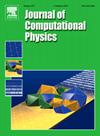Annealed adaptive importance sampling method in PINNs for solving high dimensional partial differential equations
IF 3.8
2区 物理与天体物理
Q2 COMPUTER SCIENCE, INTERDISCIPLINARY APPLICATIONS
引用次数: 0
Abstract
Physics-informed neural networks (PINNs) have emerged as powerful tools for solving a wide range of partial differential equations (PDEs). However, despite their user-friendly interface and broad applicability, PINNs encounter challenges in accurately resolving PDEs, especially when dealing with singular cases that may lead to unsatisfactory local minima. To address these challenges and improve solution accuracy, we propose an innovative approach called Annealed Adaptive Importance Sampling (AAIS) for computing the discretized PDE residuals of the cost functions, inspired by the Expectation Maximization (EM) algorithm used in finite mixtures to mimic target density. Our objective is to approximate discretized PDE residuals by strategically sampling additional points in regions with elevated residuals, thus enhancing the effectiveness and accuracy of PINNs. Implemented together with a straightforward resampling strategy within PINNs, our AAIS algorithm demonstrates significant improvements in efficiency across a range of tested PDEs, even with limited training datasets. Moreover, our proposed AAIS-PINNs method shows promising capabilities in solving high-dimensional singular PDEs. The adaptive sampling framework introduced here can be integrated into various PINN frameworks.
用于求解高维偏微分方程的 PINN 中的退火自适应重要性采样法
物理信息神经网络(PINNs)已成为解决各种偏微分方程(PDEs)的强大工具。然而,尽管 PINN 具有友好的用户界面和广泛的适用性,但它在精确求解 PDE 方面仍面临挑战,尤其是在处理可能导致局部极小值不理想的奇异情况时。为了应对这些挑战并提高求解精度,我们提出了一种名为 "自适应重要度采样(AAIS)"的创新方法,用于计算离散 PDE 的成本函数残差,其灵感来自有限混合物中用于模拟目标密度的期望最大化(EM)算法。我们的目标是通过对残差较高区域的额外点进行策略性采样来近似离散 PDE 残差,从而提高 PINN 的有效性和准确性。我们的 AAIS 算法与 PINN 中的直接重采样策略一起实施,即使在训练数据集有限的情况下,也能在一系列测试过的 PDE 中显著提高效率。此外,我们提出的 AAIS-PINNs 方法在求解高维奇异 PDE 方面表现出了良好的能力。这里介绍的自适应采样框架可以集成到各种 PINN 框架中。
本文章由计算机程序翻译,如有差异,请以英文原文为准。
求助全文
约1分钟内获得全文
求助全文
来源期刊

Journal of Computational Physics
物理-计算机:跨学科应用
CiteScore
7.60
自引率
14.60%
发文量
763
审稿时长
5.8 months
期刊介绍:
Journal of Computational Physics thoroughly treats the computational aspects of physical problems, presenting techniques for the numerical solution of mathematical equations arising in all areas of physics. The journal seeks to emphasize methods that cross disciplinary boundaries.
The Journal of Computational Physics also publishes short notes of 4 pages or less (including figures, tables, and references but excluding title pages). Letters to the Editor commenting on articles already published in this Journal will also be considered. Neither notes nor letters should have an abstract.
 求助内容:
求助内容: 应助结果提醒方式:
应助结果提醒方式:


